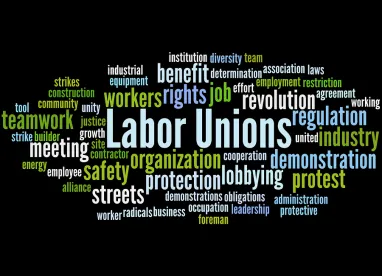Does an employer automatically engage in unlawful discrimination when it grants an improved benefit to its non-union employees but withholds the improvement from its union employees who are covered by a collective bargaining agreement? In a recent decision, Merck, Sharp & Dohme Corp, 367 NLRB No. 122, issued on May 7, 2019, the National Labor Relations Board (NLRB) said No. This is an important decision because it clearly delineates the difference between mere disparate treatment (which is lawful) and actionable discrimination (unlawful) and brings clarity to an employer’s duty to bargain over changing working conditions during the term of a collective bargaining agreement (CBA).
The case arose when Merck decided to offer a new one-time paid holiday referred to as “Appreciation Day” (the day before Labor Day 2015) to all employees except for those employees covered by a collective bargaining lacking the benefit. In a phone conference, the Company’s Executive Director of U.S. Labor Relations explained the disparate treatment by noting that “the benefit [was] not in the labor contracts ‘and we can’t unilaterally give the day’ ”, adding that “in the previous couple of years . . . the company had made . . . relatively simple changes [for non-CBA employees] and [when the Company] tried to discuss [those minor changes with its unions] outside of contract negotiations . . . the feedback from the union(s) was . . . wait until contract negotiations”. Attendees came away from the call believing and apparently reporting to employees that the Company withheld the “Appreciation Day” paid holiday from union employees because of the union’s past refusal to cooperate in agreeing to minor midterm contract changes and that the Company was not inclined to “just give it to the unions”. Based on these comments, an Administrative Law Judge (ALJ) found that the Company’s exclusion of union workers from the new benefit was motivated by the Unions’ prior refusal to midterm contract modifications and, thus, “a[n admitted] straightforward punishment” of union employees for their Unions’ past protected activity in violation of Sections 8(a)(3) and (1) of the National Labor Relations Act (the “Act” or “NLRA”). The Board, however, disagreed and reversed the ALJ.
The Board began its analysis by observing that an employer has a right to treat represented and unrepresented employees differently so long as that difference is not motivated by antiunion animus. Accordingly, a mere difference in treatment is not in and of itself unlawful. Instead, the party seeking a finding of unlawful discrimination must prove that the employer harbored antiunion animus and that a union’s or other protected concerted activity was a “substantial or motivating” factor in the employers decision to engage in the disparate treatment of union workers. Absent such proof, a mere difference in treatment is just that — a lawful difference in treatment and not unlawful discrimination.
Then, turning to the evidence upon which the ALJ relied to find Merck’s antiunion animus, the Labor Relations Director’s comments about the unions’ past refusal to agree to midterm contract changes, the Board found said proof to be devoid of animus, noting that the ALJ’s finding of “straightforward punishment” failed to take into consideration the everyday realities of the bargaining process. Indeed, collective bargaining by its very nature is an “annealing process” involving hard negotiations, posturing, brinksmanship and horse trading over a long period of time. In the Board’s view (and contrary to the ALJ), the Labor Relations Director’s statements were neither an admission of unlawful retaliation nor proof of the employer’s antiunion animus. Rather, his comments reflected the parties’ prior bargaining positions, extant contract benefits and the competing forces and counteracting pressures inherent in the bargain process. Thus, in the Board’s view, the message sent by Merck’s action was clear: if the Union was unwilling to entertain proposed midterm modifications and insisted on adhering to the terms of the contract, then Merck, too, would stand firm and the Union was going to have to live with the limitations of their contractual benefits along with their advantages.
Additionally, contrary to the ALJ, the Board found nothing pretextual about Merck’s assertion that its unilateral granting of the Appreciation Day holiday to unionized workers would have been unlawful. To the contrary, the Board found the defense to be consistent with the law, even in the absence of the Employer’s offer to bargain with the unions over the new midterm benefit, because nothing in the Act suggests that a party must bargain over or accept midterm changes. Instead, the NLRA protects every party to a collective bargaining agreement from involuntarily incurring any additional bargaining obligations for the duration of the agreement.
TAKEAWAYS:
Union workers do not have a right to be treated the same as non-union co-workers. Employers are free to treat union and non-union employees differently during a CBA’s term as long as that differential in treatment is not the result of proven antiunion animus or for the proven purpose of retaliating against unionized workers for the protected union or concerted activities. So long as the different treatment is based upon the realities of the bargaining process, it likely will not be found to be unlawful discrimination.




 />i
/>i

